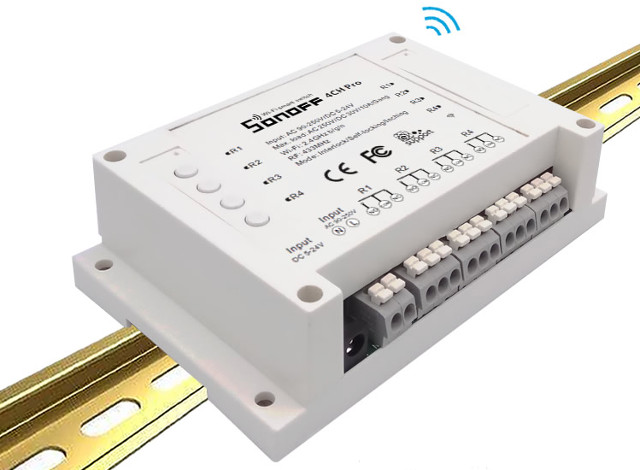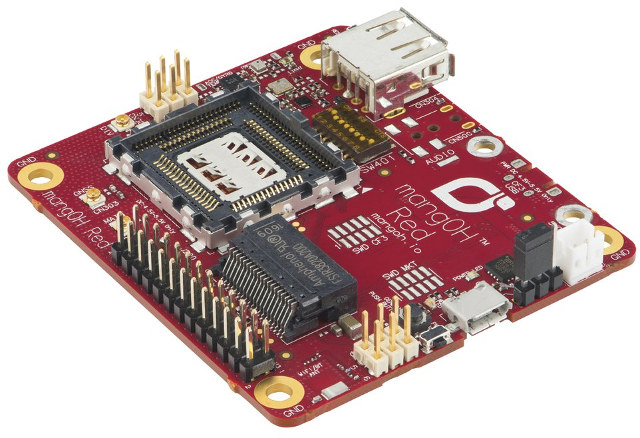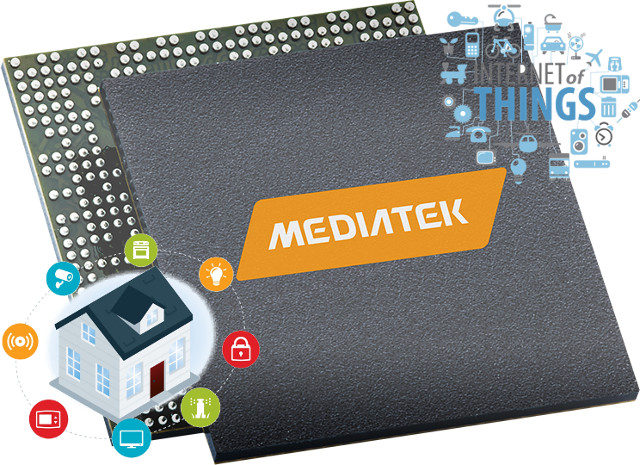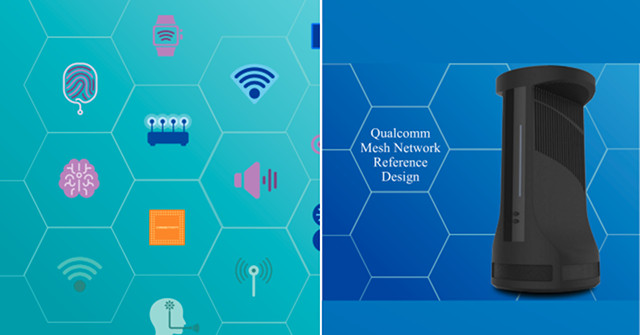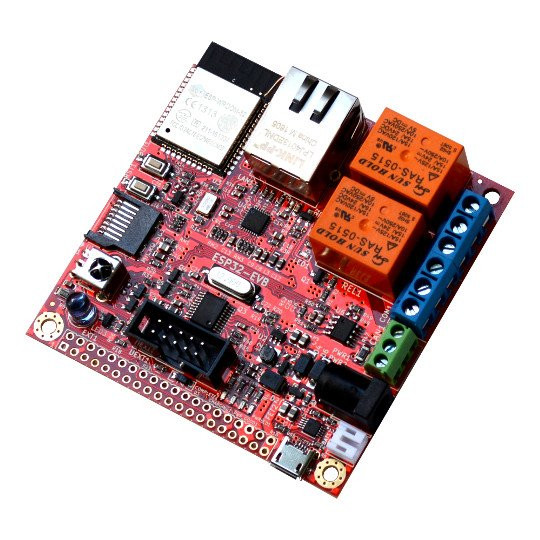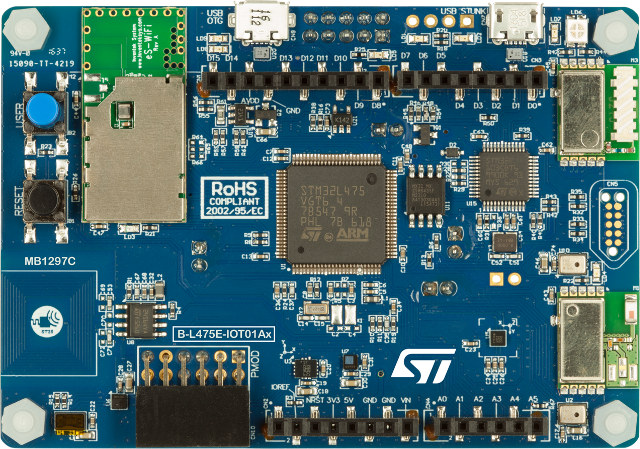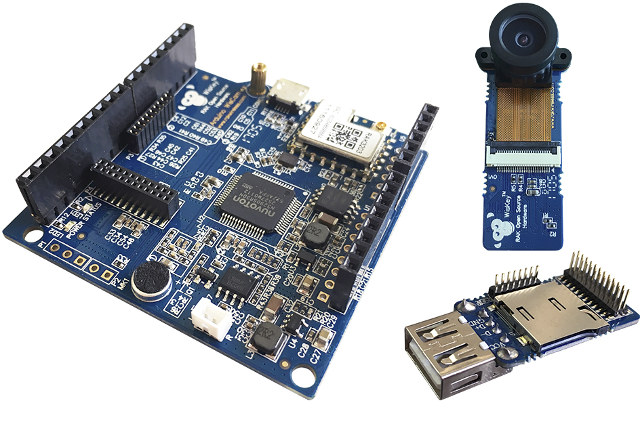ITEAD Studio’s Sonoff family is a collection of really useful and inexpensive home automation devices which have been featured multiple times on CNX Software with either to stock firmware and eWelink app, or open source firmware developed by the community. I’m using a Sonoff TH16 to control a water pump, a Sonoff Pow to monitor my office’s power consumption, and Karl used some Sonoff switches to control his lights at home. The company has now launched Sonoff 4CH Pro with 4 relays that can be controlled with buttons on the unit, WiFi, or RF remote controls, and comes in a DIN Rail enclosure. Sonoff 4CH Pro switch specifications: Connectivity – ESP8266 WiFi module and 433 MHz receiver Relays – 4x HUIKE 230V/10A relays (max 2200W per relays) with NC and NO connection Configuration – K5 & S6 switch for mode selection; K6 switch for time selection (0.5 to 4s) Misc […]
MangOH Red Open Source Hardware Board Targets Cellular Industrial IoT Applications
Sierra Wireless has announced MangOH Red open source hardware platform designed for IIoT (Industrial IoT) applications with a snap-in socket for 2G to 4G & LTE-M/NB-IoT modules, built-in WiFi and Bluetooth, various sensors, a 26-pin expansion header, and more. MangOH Red board specifications: Snap-in socket to add any CF3-compatible modules, most of which based on Qualcomm MDM9215 ARM Cortex A5 processor including: Airprime WP7502 LTE Cat 3, HSPA, WCDMA, EDGE/GPRS module Airprime WP7504 LTE Cat 3, HSPA, WCDMA, CDMA module Airprime WP7601 LTE Cat 4 module Airprime WP7603 LTE Cat 4, WCDMA module Airprime WP8548 HSPA, WCDMA, EDGE/GPRS, and GNSS module AirPrime HL6528RD quad-band GSM/GPRS Embedded Wireless Module designed for the automotive market And more…. Storage – micro SD slot Wireless MCU Module – Wi-Fi 802.11 b/g/n and Bluetooth 4.2 BLE module with an ARM Cortex-M4 core MCU (Mediatek MT7697) providing access to real-time I/Os Wireless Connectivity “Accessories” Micro SIM card […]
MediaTek Unveils MT7686, MT7682, and MT5932 WiFi SoCs for IoT and Smart Home Applications
Beside announcing MT7622 SoC for WiFi and Bluetooth 5 gateways and routers last week, Mediatek also introduced three “next generation” WiFi SoCs for the IoT and the Smart Home market during Computex 2017, namely MT7686, MT7682, and MT5932. Mediatek MT7686 is a wide temperature range WiFi SoC for appliances: MCU – ARM Cortex-M4F @ 192 MHz System Memory – 4MB + 384KB RAM Storage – 4 MB flash with XIP support Connectivity – Low-power 1T1R 802.11 b/g/n Wi-Fi subsystem Peripherals – SDIO I/F, UART, I2C, SPI, I2S, PWM, and auxiliary ADC Power Supply – Integrated Power Management Unit (PMU) Power Consumption – Connected DTIM1 <0.7mA Temperature Range – “Wide” Package – QFN48 (6x6mm) Mediatek MT7682 is promoted as a cost-effective, integrated SoC for multi-Cloud platforms: MCU – ARM Cortex-M4F @ 192 MHz System Memory – 384KB RAM Storage – 512 KB or 1 MB flash with XIP support Connectivity – […]
MediaTek MT7622 SoC with WiFi Network Accelerator Supports 4×4 802.11n WiFi & Bluetooth 5
MediaTek has launched a new ARM SoC for routers, home automation gateways, wireless audio and storage, with MT7622 equipped with a dual core ARM Cortex A53 processor, a dedicated network accelerator, 4×4 802.11n and Bluetooth 5 connectivity. Two models with be available: MT7622A with all features, and MT7622B with router features only, which probably mean no Bluetooth, and possibly less I/Os. MediaTek MT7622 specifications: Processor – Dual core ARM Cortex A53 @ up to 1.36 GHz Storage – eMMC and SDXC interfaces; storage accelerator (SATA 3.0/eSATA Gen2) Connectivity 802.11b/g/n WiFi @ 2.4GHz, 4T4R antenna; 802.11ac can be added through MT7615 SoC Bluetooth 5 Fast Ethernet Switch, RGMII and SGMII Network Accelerator – APT+HQoS, MediaTek Wi-Fi Warp Accelerator Audio – Audio Amplifier, I2S, TDM, S/PDIF USB – USB 2.0 host/device, USB 3.0 host Other Peripheral Interfaces – PCIe Gen 2.0, ADC, GPIO, I2C, IR, PMIC I/F, PWM, SPI, UART Misc – RTC The specs on the product […]
Qualcomm Unveils Mesh Networking WiFi Router / Gateway Reference Design Powered by IPQ40x8/9 NSoC
Qualcomm has just announced the Qualcomm Mesh Networking Platform for OEM and broadband providers to design home WiFi routers/gateways capable of providing “robust and consistent connectivity”, and feature voice control capabilities, centralized management and security, and a range of mesh system features. In order to speed up adoption the the platform, the company introduced the Qualcomm Mesh Networking Reference Design with the following key features & benefits: Network System-on-Chip (NSoC) – Qualcomm IPQ40x8/9 network system-on-chip with four Cortex A7 cores, 802.11ac WiFi 2×2+2×2, network and crypto accelerators Qualcomm Wi-Fi Self-Organizing (SON) feature suite will ensure corner-to-corner Wi-Fi coverage, easy set-up, automatic management and traffic optimization, as well as additional security safeguards. Carrier-Grade features with Wi-Fi SON APIs, cloud-based diagnostics Integrated voice capabilities thanks to built-in microphone array and speaker, voice recognition software, and APIs support for popular cloud-based assistant applications. Variety of backhaul options to be used to maximize the […]
Olimex ESP32-EVB Board with Ethernet, CAN Bus, and Relays up for Sale for 26 Euros
One of the new feature of Espressif ESP32 SoC over ESP8266 is the inclusion of an Ethernet MAC interface, but so far few boards come with an RJ45 jacks. ESP32 Monster board is an option, also including an OLED Display and CAN Bus, and sold on Tindie for $35, but Olimex has now stocked their ESP32-EVB board with Ethernet, CAN Bus, and two relays, and you can purchase it for 26 Euros per unit, and less in larger quantities. Olimex ESP32-EVB Rev. B specifications: Wireless Module – ESP32-WROOM32 module with 802.11 b/g/n WiFi and Bluetooth LE Wired Connectivity – 10/100M Ethernet with RJ45 jack (via LAN8710A) External Storage – micro SD slot Relays – 2x 10A/250VAC relays with LED status Expansion 40-pin GPIO female header (2.54mm pitch) UEXT connector for sensors and modules CAN Bus USB – 1x micro USB port for debugging (CH340T) and power Misc – Reset and […]
STMicro Unveils STM32L4 Discovery Kit for IoT with WiFi, BLE, NFC, Sub-GHz RF, and Plenty of Sensors
STMicro has recently introduced B-L475E-IOT01A Discovery kit powered by STM32L4 Cortex-M4 and targeting IoT nodes with a choice of connectivity options including WiFi, Bluetooth LE, NFC, and sub-GHZ RF at 868 or 915 MHz, as well as a long list of various environmental sensors. B-L475E-IOT01A Discovery kit key features and specifications: MCU – STM32L4 Series MCU based on ARM Cortex -M4 core with 1 MB Flash memory, 128 KB SRAM Storage – 64 Mbit (8MB) Quad-SPI Flash memory (Macronix) Connectivity Bluetooth 4.1 LE module (SPBTLE-RF) Sub-GHz (868 or 915 MHz) low-power-programmable RF module (SPSGRF-868 or SPSGRF-915) Wi-Fi module based on Inventek ISM43362-M3G-L44 (802.11 b/g/n compliant) Dynamic NFC tag based on M24SR with its printed NFC antenna Sensors 2x digital omni-directional microphones (MP34DT01) Capacitive digital sensor for relative humidity and temperature (HTS221) 3-axis magnetometer (LIS3MDL) 3D accelerometer and 3D gyroscope (LSM6DSL) 260-1260 hPa absolute digital output barometer (LPS22HB) Time-of-Flight and gesture-detection […]
RAK WisCam is a $20 Arduino Compatible WiFi Camera Linux Board Powered by Nuvoton N32905 ARM9 Processor
A couple of weeks ago I wrote about Rakwireless’ RAK CREATOR Pro development board based on Realtek Ameba RTL8711AM Wireless MCU, and part of their Wiskey family of development boards. Sub-family include WisNode for IoT boards, WisAP for OpenWrt boards, WisPLC for PLC hardware, and WisCam for WiFi video camera boards. The company has recently introduced Wiscam RAK5281 Arduino compatible Linux board powered by a Nuvoton ARM9 MCU, and supporting a camera module or an SD card + USB module. RAK WisCam specifications: SoC – Nuvoton N32905R3DN ARM926EJ processor @ 200 MHz with 8KB internal SRAM, 16KB IBR internal booting ROM, 16Mbit x16 DDR2 memory Storage – 128 MBit SPI flash, included sub-module adds micro SD card Connectivity – 802.11 b/g/n WiFi via Realtek RTL8189FTV module Camera via sub-module 648×488 pixel VGA CMOS Image Sensor (GC0308); 102° FOV Video – QVGA (320×240) 30FPS, VGA(640×480) 30FPS, MJPEG encoding Photo – JPEG, […]


